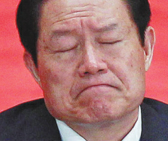
Zhou Yongkang, former security chief, is facing charges of corruption. CHINA DAILY
Judicial authorities say the coming trial of Zhou Yongkang, the country's former security chief who is facing charges of corruption, will provide a model for all future corruption trials.
Zhou's scheduled trial in a provincial-level court means there is no need for a national-level special corruption court for former high-ranking officials accused of wrongdoing, such as China set up in the early 1980s for the so-called Gang of Four, who were active during the "cultural revolution" (1966-76).
The Supreme People's Procuratorate announced on April 3 that it had assigned the Intermediate People's Procuratorate in Tianjin, a provincial-level municipality, to prosecute Zhou.
It is expected to take prosecutors one or two months to prepare.
Because Zhou is the highest ranking official to face criminal charges since 1949, and because prosecutors were assigned by the SPP, officials said that subsequent corruption trials in China are likely to use the trial as a model for the future, following its patterns and procedures.
Even though the current round of the anti-corruption campaign has rooted out a large number of suspected officials alleged to be linked in circles of power, they will likely be tried individually.
Judicial authorities will treat the Zhou proceedings "as anordinary criminal case and provide him with no special exceptions under the law", despite the high political position he once occupied, said a senior official with the Supreme People's Court, who spoke on condition of anonymity.
The 73-year-old Zhou was accused by the Tianjin People's Procuratorate of accepting bribes, abusing power and disclosing State secrets. According to the indictment, Zhou's abuses resulted in grave losses of public property and damaged the interests of the country and the people. His acts were "particularly serious", and their social impact was "bad", it said.
The reason Zhou will be tried by an intermediate court is to allow him opportunities to appeal to higher levels if he doesn't accept the outcome. In his case, an appeal would be made first to the Tianjin High People's Court, judicial officials said. In the event of disputed facts, insufficient evidence or error in applying the law in a final verdict, suspects can appeal to the Supreme People's Court or to the Supreme People's Procuratorate, which would order a new investigation if circumstances warranted.
The Tianjin procuratorate was assigned to handle the prosecution because the top judicial authorities in Beijing wanted a provincial-level procuratorate with experienced prosecutors and a courthouse with advanced equipment and the ability to accommodate the media.
According to Tianjin Daily in January, Bian Xuewen, former vice-prosecutor at the Tianjin People's Procuratorate No 2 branch, was appointed to head the No 1 branch.
Since 2004, Bian has dealt with up to 1,400 cases and participated in the investigation and prosecution of Chen Liangyu, former Party chief of Shanghai municipality, who was convicted of bribery and abuse of power and sentenced to 18 years in prison. In that case, 300,000 yuan ($48,400) was recovered by the court.
Judicial officials said the reason the Zhou trial is not being held in Beijing is that prosecutors inthe capital are already carrying heavy case loads. Also, no matter where the trial is held, the suspects can always hire the best criminal lawyers, they said, because qualified lawyers can take on cases in any city in the country.